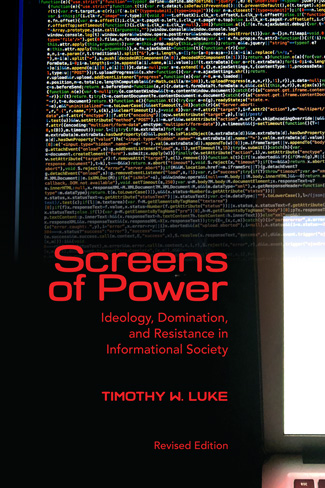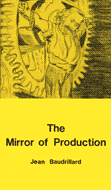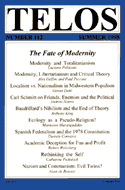By Telos Press · Tuesday, December 1, 2020 Now available! Screens of Power: Ideology, Domination, and Resistance in Informational Society, by Timothy W. Luke. Purchase your copy in our online store and save 20% by using the coupon code BOOKS20 during checkout. Also available in Kindle ebook format at Amazon.com.
Screens of Power
Ideology, Domination, and Resistance in Informational Society
 by Timothy W. Luke by Timothy W. Luke
With a Foreword by Ronald J. Deibert
This new edition of Screens of Power: Ideology, Domination, and Resistance in Informational Society, first published in 1989, reintroduces the innovative critique of informational culture, politics, and society outlined by Timothy W. Luke in Telos and other publications during the late 1970s and early 1980s. Much has changed, but far more has stayed the same, making this new edition useful for many readers, as digital images ground personal identity, informatics is geopolitics, grand history endlessly reruns as televisually formatted ritual, electronic electioneering never ends, tele-traditional cultures spin up the spirit of tele-ethnicity in new social movements, and digital divides continue crashing against cybernetic exchange.
Continue reading →
By Telos Press · Monday, November 16, 2020 Now available for pre-order: Screens of Power: Ideology, Domination, and Resistance in Informational Society, by Timothy W. Luke. Pre-order today in our online store and save 30% off the list price. Release date: December 1, 2020. Also save 30% on Luke’s Anthropocene Alerts: Critical Theory of the Contemporary as Ecocritique and on A Journal of No Illusions: Telos, Paul Piccone, and the Americanization of Critical Theory, edited by Tim Luke and Ben Agger.
Screens of Power
Ideology, Domination, and Resistance in Informational Society
 by Timothy W. Luke by Timothy W. Luke
With a Foreword by Ronald J. Deibert
Release date: December 1, 2020
This new edition of Screens of Power: Ideology, Domination, and Resistance in Informational Society, first published in 1989, reintroduces the innovative critique of informational culture, politics, and society outlined by Timothy W. Luke in Telos and other publications during the late 1970s and early 1980s. Much has changed, but far more has stayed the same, making this new edition useful for many readers, as digital images ground personal identity, informatics is geopolitics, grand history endlessly reruns as televisually formatted ritual, electronic electioneering never ends, tele-traditional cultures spin up the spirit of tele-ethnicity in new social movements, and digital divides continue crashing against cybernetic exchange.
On now countless screens of power, which are embedded in billions of smartphones, taxi seats, elevator panels, automobile dashboards, refrigerator doors, airport walls, work cubicles, skyscraper displays, exercise machines, and home video centers, a mix of disinformative mystifications exploits with vivid images of violence the unprecedented inequalities and inequities expressed in America’s bitter racial, gender, ethnic, and class conflicts. Their impact is sparking widespread popular resistance because many citizens feel oligarchy and demagoguery in both political parties are eclipsing democracy and opportunity.
Continue reading →
By Frederick H. Pitts · Tuesday, April 2, 2013 This is the second of two blog posts by Frederick H. Pitts that reassess the importance and impact of Jean Baudrillard’s The Mirror of Production. Read the first post here. Where the first post dealt with Baudrillard’s criticism of the productivism of political economy and its Marxist critique, the second deals with the implications of Baudrillard’s critical analysis for any radical alternative to production.
 In the first post, we explored Baudrillard’s critique of productivism. The attributing of some kind of essential humanity to labor is identified by Baudrillard as one of the most pernicious effects of the productivism in political economy, Marx included. Indeed, humanism itself can be seen as the “product” of political economy (Baudrillard, 22). Taking over the “phantasm” of “labor as the human essence” from political economy, Baudrillard suggests Marx projected this understanding upon the working class as “their central means of self-comprehension.” Rather than maintaining a narrow fixation on the condition of one’s exploitation as labor as the means by which this exploitation can be transcended, Baudrillard argues that workers must liberate themselves from the status of “labor-power,” and “think themselves under another sign than that of production” (Poster, 3). In the first post, we explored Baudrillard’s critique of productivism. The attributing of some kind of essential humanity to labor is identified by Baudrillard as one of the most pernicious effects of the productivism in political economy, Marx included. Indeed, humanism itself can be seen as the “product” of political economy (Baudrillard, 22). Taking over the “phantasm” of “labor as the human essence” from political economy, Baudrillard suggests Marx projected this understanding upon the working class as “their central means of self-comprehension.” Rather than maintaining a narrow fixation on the condition of one’s exploitation as labor as the means by which this exploitation can be transcended, Baudrillard argues that workers must liberate themselves from the status of “labor-power,” and “think themselves under another sign than that of production” (Poster, 3).
Continue reading →
By Frederick H. Pitts · Tuesday, March 26, 2013  It seems an apt time to reassess the importance and impact of Jean Baudrillard’s The Mirror of Production. Several reasons spring to mind. We are approaching, in 2013, the 40th anniversary of the original French publication. Since the publication of the translated version in 1975 by Telos Press, the themes presented in the book have gained increasing contemporary currency, not least in popular critiques of production such as Kathi Weeks’s recent The Problem With Work (2012) and the growing literature on Italian autonomist theory. Finally, the passing in October 2012 of Mark Poster, responsible for the book’s translation into English, invites us to consider his excellent introduction and condensation of Baudrillard’s complex and challenging argument. In two blog posts, appearing today and next week, I will discuss some of the central themes of The Mirror of Production and attempt to relate them to broader intellectual currents and issues. Today’s post deals with the critical analysis that Baudrillard offers of the perceived “productivism” of both political economy and its Marxist critique. It seems an apt time to reassess the importance and impact of Jean Baudrillard’s The Mirror of Production. Several reasons spring to mind. We are approaching, in 2013, the 40th anniversary of the original French publication. Since the publication of the translated version in 1975 by Telos Press, the themes presented in the book have gained increasing contemporary currency, not least in popular critiques of production such as Kathi Weeks’s recent The Problem With Work (2012) and the growing literature on Italian autonomist theory. Finally, the passing in October 2012 of Mark Poster, responsible for the book’s translation into English, invites us to consider his excellent introduction and condensation of Baudrillard’s complex and challenging argument. In two blog posts, appearing today and next week, I will discuss some of the central themes of The Mirror of Production and attempt to relate them to broader intellectual currents and issues. Today’s post deals with the critical analysis that Baudrillard offers of the perceived “productivism” of both political economy and its Marxist critique.
Continue reading →
By Itai Farhi · Friday, November 4, 2011 As an occasional feature on TELOSscope, we highlight a past Telos article whose critical insights continue to illuminate our thinking and challenge our assumptions. Today, Itai Farhi looks at Anthony King’s “Baudrillard’s Nihilism and the End of Theory,” from Telos 112 (Summer 1998).
 The discipline of critical theory, originating in the work of the Frankfurt School, attempts to move from pure description of society toward a critique of society with the goal of bringing about change. In recent years, this discipline has itself been criticized. One of the leaders of this anti-critical theory crusade was Jean Baudrillard, whose intellectual legacy in relation to the state of modern theory Anthony King evaluates in his article “Baudrillard’s Nihilism and the End of Theory.” The discipline of critical theory, originating in the work of the Frankfurt School, attempts to move from pure description of society toward a critique of society with the goal of bringing about change. In recent years, this discipline has itself been criticized. One of the leaders of this anti-critical theory crusade was Jean Baudrillard, whose intellectual legacy in relation to the state of modern theory Anthony King evaluates in his article “Baudrillard’s Nihilism and the End of Theory.”
Continue reading →
|
|
 by Timothy W. Luke
by Timothy W. Luke In the
In the  The discipline of critical theory, originating in the work of the Frankfurt School, attempts to move from pure description of society toward a critique of society with the goal of bringing about change. In recent years, this discipline has itself been criticized. One of the leaders of this anti-critical theory crusade was Jean Baudrillard, whose intellectual legacy in relation to the state of modern theory Anthony King evaluates in his article “Baudrillard’s Nihilism and the End of Theory.”
The discipline of critical theory, originating in the work of the Frankfurt School, attempts to move from pure description of society toward a critique of society with the goal of bringing about change. In recent years, this discipline has itself been criticized. One of the leaders of this anti-critical theory crusade was Jean Baudrillard, whose intellectual legacy in relation to the state of modern theory Anthony King evaluates in his article “Baudrillard’s Nihilism and the End of Theory.” 

